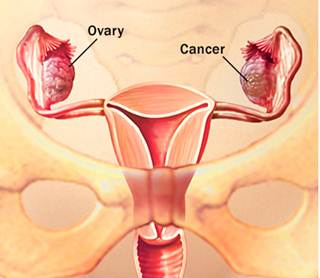The survival rates make grim reading, but
w&h is backing Target Ovarian Cancer’s campaign to make one million women
aware of the symptoms… and save lives
While
regular cervical smear tests and mammograms have become a way of life, there is
no screening programme for the deadliest of all gynaecological cancers. More
than that, the symptoms of ovarian cancer can be confused with conditions such
as Irritable Bowel Syndrome, leading to delay in seeking help or misdiagnosis.
This
means that out of the 6,500 women diagnosed each year, sadly, only one in three
will live beyond five years. Ovarian cancer is nearly four times as common as
cervical cancer. Twelve women die every day from this disease, yet almost a
third of women face delays of six months or more in getting a correct diagnosis
from first visiting their GP, and a similar proportion are diagnosed through
Accident and Emergency.

Frustratingly,
if women were diagnosed at an early stage, it is believed 70 per cent could
survive, but at present, in three-quarters of all cases, the cancer has already
spread. This makes successful treatment much more difficult.
Yet
our knowledge of this cancer is improving fast and new guidance from the
National Institute for Health and Clinical Excellence (NICE) could help GPs
identify symptoms early enough
What are the symptoms?
Lynn
Holmes, gynaecological Clinical Nurse Specialist (CNS) for Hull and East
Yorkshire Hospitals NHS Trust, suggests three aspects to bear in mind when
considering seeking advice about symptoms: Are they frequent and happen more
than 12 times a month? Are they persistent and don’t go away? Are they new and
not normal for you? It may be help to make a note of symptoms and when they
occur, and if you are worried, make an appointment with your GP. These are
signs to watch for…
·
Increased
abdominal size or persistent bloating.
·
Feeling
full quicker
·
Urgency
or more frequent need to empty the bladder
·
A
feeling of discomfort or pressure in the abdomen – not acute pain.
·
Occasionally,
other symptoms can include changes in bowel habit, feeling very tired and
unexplained weight loss.
What you can do

“Three quarters of women are diagnosed
once the cancer has already spread – only pancreatic cancer has a higher rate”
Spread the word Target Ovarian Cancer want one million women to understand
what to look out for and how to seek help. And it’s all about you! Visit their
website to download the symptoms leaflet, give it to your friends and find easy
ways to raise awareness. Earlier diagnosis means saving lives, so learn about
the symptoms and spread the world.
What’s needed Lack of investment has meant no new life-extending treatments
for women with ovarian cancer have been developed for more than 20 years, but
you can change that. Target Ovarian Cancer aim to raise money to fund research
so that at least two new treatments or techniques are in final clinical trials
by 2020. Find ideas to raise money on the Target Ovarian Cancer website.
Learn
more at targetovariancancer.org.uk/onemillion or by calling (020) 79235470
Seeing your gp
While
it’s unlikely you have such a serious condition, it’s fine to tell your GP you
are worried about ovarian cancer. They can carry out a physical examination
and, if necessary, arrange a CA-125 blood test, which is not infallible but
looks for a specific cancer marker in the blood. Your GP can also refer you for
an ultrasound, to check the ovary, possibly followed by either an MRI or CT
scan, depending on your hospital.
How is it treated?

There are more than 30 different types
of ovarian cancer
Surgery
and chemotherapy are the main options. Mr Khalil Razvi, consultant
gynaecologist at Southend University Hospital, says it’s normal to perform a
total hysterectomy. Sometimes chemotherapy is used to shrink the tumour before
surgery.
Mr
Razvi adds, “There is a trend now towards more radical surgery, especially in the
upper abdomen, including removing the peritoneum, which is the lining of tissue
that drapes the abdonminal wall and organs where the cancer may come back. Most
women will then be given a course of Taxol and Carboplatin chemotherapies – and
the combination usually clears 70 per cent of women of cancer. However, ovarian
cancer does have a high recurrence rate.”
Doctors
are now interested in Avastin (bevacizumab), a drug used in other cancers, to
treat newly diagnosed advanced ovarian cancer. It’s not available on the NHS
and it’s too early to say what difference it will make.